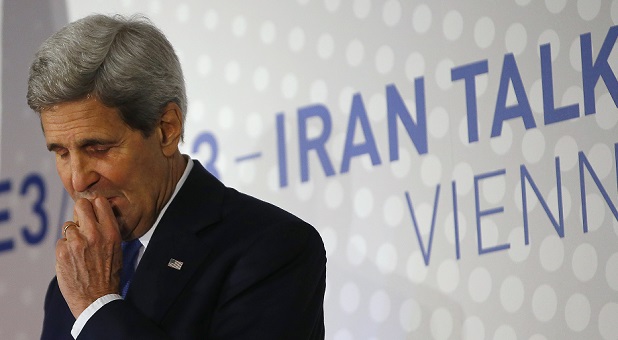Iran Deal May Require U.S. to Attack Israel
President Obama’s nuclear agreement with Iran has one little-known provision that may make the world a much more dangerous place.
Analysts from the U.S. and Israel warn that, under its terms, the United States may be legally obligated to thwart—or even physically attack—the state of Israel.
The agreement calls for mutual “cooperation” against any individual, or government, that tries to “sabotage” Iran’s nuclear program.
The provision demands:
10.1. Cooperation in the form of training courses and workshops to strengthen Iran’s ability to prevent, protect and respond to nuclear security threats to nuclear facilities and systems as well as to enable effective and sustainable nuclear security and physical protection systems;
10.2. Cooperation through training and workshops to strengthen Iran’s ability to protect against, and respond to nuclear security threats, including sabotage, as well as to enable effective and sustainable nuclear security and physical protection systems.
Failing to “sabotage” Saddam Hussein’s nuclear program in the lab, Israel bombed Iraq’s Osirak nuclear reactor on June 7, 1981. Sen. Marco Rubio asked Secretary of State John Kerry whether the U.S. military would be required to stop such a bombing against Iran.
Kerry denied that was the case, saying he would coordinate with Israel in any Middle Eastern stand-off. “I don’t see any way possible that we will be in conflict with Israel with respect to what we might want to do there,” he said.
“I think we just have to wait until we get to that point,” he said.
In other words: We have to pass the agreement before we find out what is in it.
He also defended the provision as self-evident. “If you are going to have a nuclear capacity, you clearly want to be able to make sure that those are adequately protected,” he said.
Rubio said this provision seems to require the United States to “provide “training” to help Iran “respond” to any form of sabotage—including that conducted by Israel’s intelligence organization, the Mossad.
Of course, depriving Iran of nuclear weapons capability is precisely the stated position of every American politician, including Barack Obama and John Kerry. Why would it undermine an ally trying to secure that U.S. policy objective?
Donald Trump raised the provision earlier this week as an example of the agreement’s weakness. “There is something in the Iran deal that people I don’t think really understand or know about,” the Republican front-runner told CNN on Tuesday. “And nobody is ever to explain it that if somebody attacks Iran, we have to come to their defense.”
CNN then accused Trump of being “incorrect” about the matter. PolitiFact – which has had some misleading analysis of its own – similarly rated Rubio’s statements as false.
The State Department insists the provision is intended only to keep nuclear secrets safe from terrorists.
“it is in the interest of all countries that nuclear material be safeguarded from theft and terrorist attacks—the types of ‘sabotage’ in question,” Kerry’s senior adviser for strategic communications Marie Harf, told CNN.
But Iran is the world’s leading state sponsor of terrorism.
If the Obama administration wants to keep nuclear material out of terrorists’ hands, the best way would be to keep it out of the hands of Tehran’s mullahs.















































